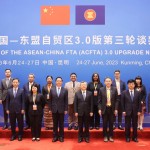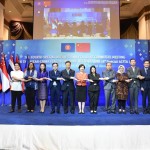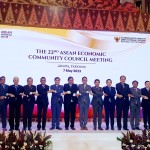Tổng số bài đăng 471.
The ASEAN Digital Economy Framework Agreement (DEFA) is one of the key initiatives of the Bandar Seri Begawan Digital Transformation Roadmap (BSBR) – ASEAN’s digital transformation agenda adopted at the 20th ASEAN Economic Community (ECC) Summit. The DEFA, which is expected to conclude negotiations by the end of 2025, is expected to establish a solid foundation for ASEAN to become a leading digital economy region, serving as a comprehensive document that consolidates action plans related to digital transformation and the digital economy into a single comprehensive strategy.

According to the e-Conomy SEA report published in 2022, ASEAN is currently the region that experts assess to have the highest growth rate in e-commerce and digital economy. With a compound growth rate of 21% reaching 200 billion USD in 2022, ASEAN's e-commerce market is estimated to reach 330 billion USD in 2025. In addition, according to research by the Boston Consulting Group (BCG), with the current growth rate of ASEAN, the value of the e-commerce market will reach 1 trillion USD in 2030, but with the implementation of DEFA, the figure could reach 2 trillion USD in 2030. Not only having a positive impact on trade issues, the process of negotiating DEFA also includes factors related to upgrading the electronic payment system, improving consumer protection issues, protecting information, personal data, etc. As a result, DEFA is expected to establish a solid, comprehensive foundation to turn ASEAN into a region with a leading digital economy.
In the ASEAN DEFA Agreement Study conducted by BCG, conducted by the ASEAN Coordinating Committee on e-Commerce and Digital Economy (ACCED) and coordinated by ASEAN sectoral bodies and technical groups, the DEFA will include nine core provisions to promote seamless, secure, and transparent cross-border digital trade through unified technology and standards. These provisions have been proposed for consideration by ASEAN member states, based on best practices, private sector input, and extensive discussions with AMS and sectoral bodies.
The current negotiations acknowledge the differences in development levels and readiness among ASEAN countries for future commitments and implementation of the DEFA Agreement. To help address these differences, the 56th ASEAN Economic Ministers Meeting held in September 2024 in Laos requested the Negotiating Committee to discuss more flexible and innovative options to allow countries that are not ready to have time to improve their capacity before implementing the deep and comprehensive commitments expected to be included in the DEFA Agreement to ensure the realization of the ASEAN Leaders' vision of building an open, secure, interoperable, competitive and inclusive regional digital economy.
By October 2024, the DEFA Negotiation Committee have made efforts to discuss all provisions, including new contents, towards reaching consensus on 50% of the total contents by the end of 2024.












